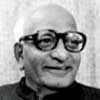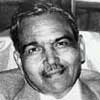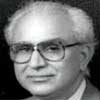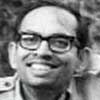|
|
|
My story today your story
Tomorrow - Anil Agarwal (November 30, 1996)
COMMENTS |
 “Statistics
say that incidence of cancer in urban areas is almost double that in rural areas, which
proves that cancer cells thrive in a polluted atmosphere. We cause pollution in the name
of progress, as automobiles contribute significantly to it. Developing countries should,
as a matter of policy, encourage public transport to keep pollution to the minimum.
Pesticides are another major cause of cancer. Use of pesticides has grown in the present
era of increased agricultural productivity. What causes the problem apparently is the
residue of pesticides; this means the quantity of pesticides used needs to be reduced and
their strength should be reviewed downwards. “Statistics
say that incidence of cancer in urban areas is almost double that in rural areas, which
proves that cancer cells thrive in a polluted atmosphere. We cause pollution in the name
of progress, as automobiles contribute significantly to it. Developing countries should,
as a matter of policy, encourage public transport to keep pollution to the minimum.
Pesticides are another major cause of cancer. Use of pesticides has grown in the present
era of increased agricultural productivity. What causes the problem apparently is the
residue of pesticides; this means the quantity of pesticides used needs to be reduced and
their strength should be reviewed downwards.
“There is another aspect of the problem.
MNCs introduce products which have been banned in countries of their origin, into our
markets. The fact of the ban is probably carefully concealed. There is a growing shift of
such hazardous products following a mistaken belief in industrialisation and
liberalisation. It may be difficult to persuade commercial ventures to be more socially
conscious as they look to profits. But non-government organisations will have to be more
vigilant.”
Madhu Dandavate, deputy chairperson, Planning Commission |
 “We are
caught in a difficult cycle of population, poverty, development and environment... Four
decades ago, how many policy-makers expected Delhi to grow to its present size? Even
today, we continue to debate for a mass transport system which would reduce pollution and
absolve Delhi of the dubious distinction of being the most polluted city... How much do we
know about the way pollutants like sulphur dioxide play havoc with people’s health?
Precious little. I remember a paper published in 1964-65 on the loss of ability of eggs to
produce chicks in sea-gulls. The eggs were found to contain BHC derivatives. The world did
not care to ban BHC at that time, and continued on the path of development. It is possible
to overcome the problems raised by Anil partially, provided that we do not go beserk on
the bug of commercialisation and trade. We need sincere and committed scientists who can
speak plain facts and educate our politicians.” “We are
caught in a difficult cycle of population, poverty, development and environment... Four
decades ago, how many policy-makers expected Delhi to grow to its present size? Even
today, we continue to debate for a mass transport system which would reduce pollution and
absolve Delhi of the dubious distinction of being the most polluted city... How much do we
know about the way pollutants like sulphur dioxide play havoc with people’s health?
Precious little. I remember a paper published in 1964-65 on the loss of ability of eggs to
produce chicks in sea-gulls. The eggs were found to contain BHC derivatives. The world did
not care to ban BHC at that time, and continued on the path of development. It is possible
to overcome the problems raised by Anil partially, provided that we do not go beserk on
the bug of commercialisation and trade. We need sincere and committed scientists who can
speak plain facts and educate our politicians.”
S K Sinha, national professor, Indian Council of Agricultural Research, New
Delhi
|
 “Reading the
travails of Anil should be enough to move any rational mind to search for remediation. But
would it happen here? I visualise a second cancer — a cancer of the mind promoting
the first, the cancer of the body. How otherwise did a country not refuse products of
Union Carbide, even after the company caused Bhopal? MNCs are now selling
‘environmental technology’ to the poorer world because they don’t have
markets in their own countries. To do this, they are equipping themselves with appropriate
international trade regulations; this act is dished out as niceties in trade and
environment linkage. Meanwhile, we continue to give lip-service to sustainable lifestyle,
remaining steadfastly indifferent to the wretched and deprived millions, and allow
business decisions to rule the next century. History, till then, will continue to be one
of sustainable impoverishment.” “Reading the
travails of Anil should be enough to move any rational mind to search for remediation. But
would it happen here? I visualise a second cancer — a cancer of the mind promoting
the first, the cancer of the body. How otherwise did a country not refuse products of
Union Carbide, even after the company caused Bhopal? MNCs are now selling
‘environmental technology’ to the poorer world because they don’t have
markets in their own countries. To do this, they are equipping themselves with appropriate
international trade regulations; this act is dished out as niceties in trade and
environment linkage. Meanwhile, we continue to give lip-service to sustainable lifestyle,
remaining steadfastly indifferent to the wretched and deprived millions, and allow
business decisions to rule the next century. History, till then, will continue to be one
of sustainable impoverishment.”
Dhrubajyoti Ghosh, trustee, eastern region, World Wide Fund for Nature-India |
 “The post-World War II period has been one of
synthetic compounds, totally alien to our biosphere and to biochemical cycles of our
planet. This led to the publication of a remarkable book — Silent Spring — by
Rachel Carson in 1962. Perhaps the compelling reason for Carson to write the book was
that, like Anil, she too suffered from cancer, and wanted to forewarn others. Our
biosphere has no capacity to degrade the human-made “The post-World War II period has been one of
synthetic compounds, totally alien to our biosphere and to biochemical cycles of our
planet. This led to the publication of a remarkable book — Silent Spring — by
Rachel Carson in 1962. Perhaps the compelling reason for Carson to write the book was
that, like Anil, she too suffered from cancer, and wanted to forewarn others. Our
biosphere has no capacity to degrade the human-made
unnatural compounds, and these accumulate, biomagnify and cause a host of problems. The
regrettable part is that governments and the industry have underplayed these aspects.
Human being in its present form is the most unnatural species of the biosphere —
involved in a war against the biosphere and committing ecological sins against its only
home, the earth. The moral from the ordeal faced by Carson and Anil is that we must
dedicate ourselves to a life of voluntary simplicity, and must relentlessly fight for our
natural environment and reject all that is alien to our biosphere so as to ensure safety
for those who will follow us on this planet.”
T N Khoshoo, distinguished fellow, Tata Energy Research Institute, New Delhi |
 “While Anil
points at politicians and bureaucrats, he does not spare me and my colleagues either. For
he accuses the Indian scientific community of playing down serious issues of public
interest — a “conspiracy of silence”. I must, unhappily, concur. Scientists
alongwith others in the organised services — like industry — constitute the
country’s omnivores, the all powerful consumers. We are collectively engaged in
equating development with state-sponsored resource-flows for our own benefit, even if it
is at the cost of the environment and the rest of India’s population. Consider
chemical pesticides. The state provides largescale subsidies for supply of pesticides to
farmers. Not all of these actually reach the farmers; politicians and bureaucrats share in
the misappropriated spoils. The pesticide industry has its sales boosted by the subsidies
and profits in the protected sellers’ market. Undoubtedly, it kicks back part of
these profits for being allowed to set up a unit. The green revolution farmers, too, do
well under the system... The agricultural scientists find it profitable to with the
pesticide industry — to get research contracts or post-retirement jobs. The chemists
too are either allied with the chemical industry or are busy pursuing problems in fashion
in the West. Thus, we have built up a high-cost, low-quality economy, and we have an
environmental regime which builds up the world’s highest level of pesticide residues
in human bodies, while maintaining one of the world’s lowest levels of pesticide
consumption. Only a radical restructuring of our system of governance, to render it
transparent and accountable and to stop pampering a narrow elite at state expense will get
us out of this mess. But will we omnivores ever agree?” “While Anil
points at politicians and bureaucrats, he does not spare me and my colleagues either. For
he accuses the Indian scientific community of playing down serious issues of public
interest — a “conspiracy of silence”. I must, unhappily, concur. Scientists
alongwith others in the organised services — like industry — constitute the
country’s omnivores, the all powerful consumers. We are collectively engaged in
equating development with state-sponsored resource-flows for our own benefit, even if it
is at the cost of the environment and the rest of India’s population. Consider
chemical pesticides. The state provides largescale subsidies for supply of pesticides to
farmers. Not all of these actually reach the farmers; politicians and bureaucrats share in
the misappropriated spoils. The pesticide industry has its sales boosted by the subsidies
and profits in the protected sellers’ market. Undoubtedly, it kicks back part of
these profits for being allowed to set up a unit. The green revolution farmers, too, do
well under the system... The agricultural scientists find it profitable to with the
pesticide industry — to get research contracts or post-retirement jobs. The chemists
too are either allied with the chemical industry or are busy pursuing problems in fashion
in the West. Thus, we have built up a high-cost, low-quality economy, and we have an
environmental regime which builds up the world’s highest level of pesticide residues
in human bodies, while maintaining one of the world’s lowest levels of pesticide
consumption. Only a radical restructuring of our system of governance, to render it
transparent and accountable and to stop pampering a narrow elite at state expense will get
us out of this mess. But will we omnivores ever agree?”
Madhav Gadgil, Centre for Ecological Sciences, Indian Institute of Science,
Bangalore |
 “There can be a clinical description of
environmental toxicity, carcinogens and malignance. However, the essence of the matter is
the human being. Statistics and environmental sciences do not dilute the essential human
context in which this article has been written. This relates to a set of issues. Firstly,
the Indian city is rapidly declining. I stay off and on in Delhi. The degradation of Delhi
as a city is far more obvious to an individual who sees it after a number of years. One of
the other key features of the Indian scene has been a rapid deterioration in the nature of
information given by different sources. This is true of land and its characteristics,
besides areas like demographic indicators, health indicators and morbidity. Anil Agarwal
picks out his facts and carefully marshals them in directing his ire at
‘experts’, who discuss the problem casually. Is somebody listening out there? “There can be a clinical description of
environmental toxicity, carcinogens and malignance. However, the essence of the matter is
the human being. Statistics and environmental sciences do not dilute the essential human
context in which this article has been written. This relates to a set of issues. Firstly,
the Indian city is rapidly declining. I stay off and on in Delhi. The degradation of Delhi
as a city is far more obvious to an individual who sees it after a number of years. One of
the other key features of the Indian scene has been a rapid deterioration in the nature of
information given by different sources. This is true of land and its characteristics,
besides areas like demographic indicators, health indicators and morbidity. Anil Agarwal
picks out his facts and carefully marshals them in directing his ire at
‘experts’, who discuss the problem casually. Is somebody listening out there?“His resume of the current pesticide scene and the injection of
carcinogens into human bodies, mothers’ milk, daily foods, etc is devastating. I had
written a similar article in the Economic and Political Weekly and showed that while the
absolute level of pesticide application was still low, in some groups and regions (paddy
and cotton, for instance) it had reached intolerable levels. At the policy level, there
was the same wooden-
headed response. Excessive controls — not for reaching objectives — excessive
protection of domestic vested interests, and an inability
to master the great technology changes taking place were also there. Nobody was willing to
respond to knowledge. Fifteen technical grade pesticides were put on the open general
licence, but industry got the finance ministry to withdraw the initiative. Urbanisable
India is not required to obey any laws — because in many cases they are not there.
Luxury bungalows and high-rise houses come up without any sanitation, roads or water
supply; cesspools emerge; sewage mixes with drinking water; we get the plague and the
dengue. But there are no reliable morbidity
statistics… How many more people have to die before individual hedonism and myopia
will give way to social concern? You had better heed me, dear reader, for as Anil Agarwal
says, it won’t be him the next time.”
Y K Alagh, minister of state for planning and programme implementation and
science & technology |
 “There can be no denying either the horrifying
nature of cancers in general and lymphoma in particular, or the growing prevalence of “There can be no denying either the horrifying
nature of cancers in general and lymphoma in particular, or the growing prevalence of
cancer in our country, particularly in congested and polluted urban
areas. Nor are there any doubts about statistical associations between incidences of
cancer and concentrations of toxic pollutants
in the environment and the consequent risks to human health and welfare, or the serious
public concern the above should cause in our country, which considers economic poverty and
improper distribution of wealth as its only two problems…“In the activated sludge process of biological wastewater treatment, the
most dreaded condition that fouls up the system is called ‘sludge-bulking’. With
all the research and
knowledge behind us, no one is still able to say what causes ‘sludge-bulking’.
To me, it seems cancers are similar to sludge-
bulking. And what does one do to avoid such a condition? The only alternative is to ensure
balanced and stable operation, in line with the original assumption of the design. In my
opinion, awareness and concern for the hazards posed by toxic chemicals and processes that
were not part of the original assumptions of the design of the human body, are a must.
Such awareness should lead to a willingness to live without the facilities or products
that application of these delivered. For such chronic, systematic ailments caused by
imbalance or pollutants, the treatment
has to be as horrific as the disease. The only desirable and practical course to avoid
such suffering would be serious curtailments of our needs and lifestyles, not just on
individual but on community and national levels.”
G D Agarwal, ex-member secretary, Central Pollution Control Board |
“Besides pesticides,
indiscriminate use of hazardous drugs have destroyed the immune system of the body. On the
other hand, bacteria and pests have developed immunity
against drugs. The nexus of politicians, bureaucrats and businessfolk in India have no
consideration for clean air, water or food. Because of their apathy and self-interest, our
country has become the dumping ground of hazardous and toxic wastes of the developed
world. During the last two years, US, Australia and Canada exported 11,859 tonnes (t),
9,034 t and 7,270 t of hazardous wastes respectively to India alone. It is time that a
vigorous campaign of awareness of toxic materials and contamination should be carried out
amongst
the people. Our right to a pollution-free environment should be guaranteed.”
Banka Behary Das, president, Orissa Krushak Mahasangh
“Coming from a person who has suffered from this dreaded
disease, the article rightly brings out the elements which threaten humankind. The
deteriorating state of our environment — brought about by chemical and bacterial
contamination — is by far the most dangerous cause of cancer.”
Abid Hussain, vice chairperson, Rajiv Gandhi Institute of Contemporary Studies, New Delhi
|
|
|
|
|
|
|


